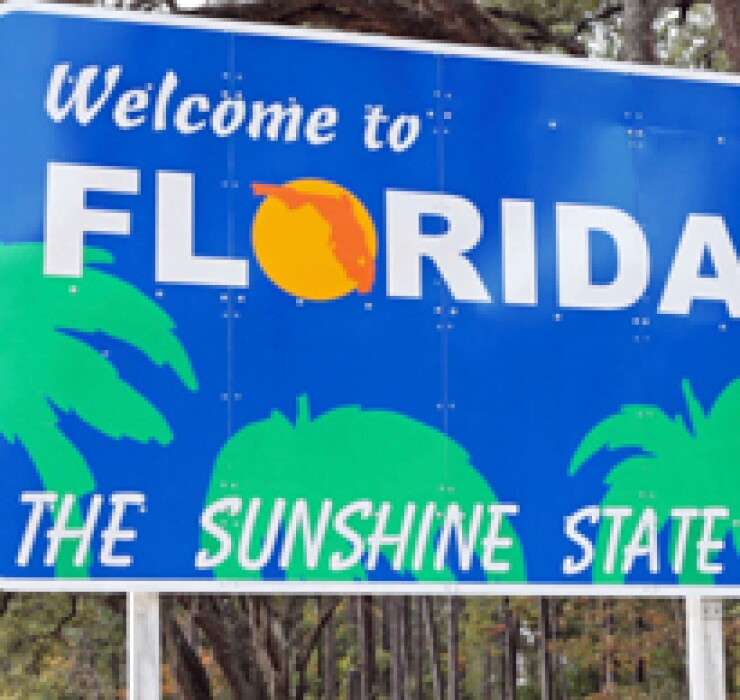Florida, one of the last two holdout states to enact economic nexus legislation in the wake of the Supreme Court’s Wayfair decision on taxing online sales, has finally passed a bill that applies sales tax collection requirements to remote sellers and marketplace facilitators.
Under the bill, remote sellers and marketplace facilitators will be required to collect Florida sales taxes on sales to purchasers in Florida if the seller or facilitator makes a substantial number of sales into the state. “Substantial” is defined as conducting any number of taxable remote sales into Florida exceeding $100,000 during the previous calendar year. The bill goes into effect on July 1, 2021.
Governor Ron DeSantis, who was against similar legislation when he was a member of Congress, signed the bill April 19. Missouri is now the only state that imposes a sales tax that hasn’t enacted such legislation.
“The issue was always that they didn’t want any more new taxes,” said Scott Peterson, vice president of U.S. tax policy and government relations at Avalara. “That’s a perfectly valid position to take. If you’re a ‘no-tax’ legislator, the last thing you want is another tax. They never before had a need for the additional money because they could always balance their budget. But things have changed.”
The pandemic created massive unemployment in many states, depleting their unemployment insurance funds. “When the fund falls below a specified level, it triggers an automatic increase on employers in the state,” Peterson added.
Every state has its own unemployment fund, plus access to a federal fund that loans the states money to pay the insurance, which the states then have to repay. “Employers end up having to pay higher taxes to pay back the federal government,” Peterson explained.

“The pandemic, with its effect on collection and spending in Florida seems to have changed Governor DeSantis’ mind,” said Peterson. “Before, the thought was, ‘This will bring in money and we don’t know what to do with the additional money.’ Well, the pandemic solved that. One of the things about the unemployment insurance fund is that there’s always money coming in and money going out.”
The increases are automatic, Peterson noted. “When the fund falls below a specified level, it triggers an automatic increase on employers. The federal government has a loan program, to loan states money to pay the insurance, but they have to pay it back — employers in the state end up paying higher taxes to pay back the federal government.”
Florida’s fund is currently at zero, so the state will use the money from collecting tax on internet sales to pay back the federal government, and that will stop the automatic increase in unemployment insurance taxes for local employers.
Florida retailers have been pushing the government to level the playing field, according to Peterson. “Up to now, Florida retailers have been collecting the sales taxes of other states, and yet Florida did not impose the same burden on everyone else, but retailers from those states have not been picking up Florida’s tax.”
The new law revises the definition of “retail sale” to include sales facilitated through a marketplace.
“Every other state making remote sellers collect has included requiring marketplace providers to collect,” Peterson noted. “There’s been a long legal debate over a state’s right to make a marketplace collect sales tax when the marketplace says, ‘We’re not the seller, someone else is.’ But Florida ignored the distinction, and that’s typical of every other state that has done the same thing.”
The direct-to-consumer alcohol industry may be typical of many remote sellers and marketplaces, according to Jeff Carroll, general manager for beverage alcohol at Avalara. This was one industry in particular that was hoping Florida would remain a holdout in enactment of economic nexus.
“This new legislation has DTC alcohol sellers, and in particular wine producers, on guard,” said Carroll. “Wineries, producers and marketplaces wanted Florida to maintain the status quo, and the situation can be described as divided, at best. Economic nexus is adding layers of complexity onto one of the most highly regulated industries in the U.S., and sellers are scrambling to understand and comply with new regulations.”
The Florida law on beverages may have a spillover effect, so to speak, on other states. “Although the complexities for beverage alcohol sellers exist in the country as a whole, the economic nexus news is important in Florida because it’s a big destination state for wine shipments,” he added. “And wineries have not previously needed to register in Florida, but will now need to get with the economic nexus compliance program.”





